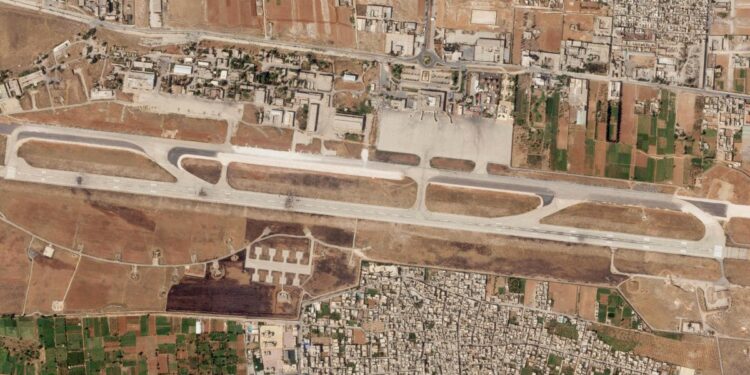Israeli attack damages runway of Syrian airport
The strike on Tuesday at Aleppo International Airport comes as Israel continues to target what it describes as Iranian arms shipments to Syria to support its long-beleaguered president Bashar Assad in his country’s crushing war.
Planet Labs PBC satellite images taken on Wednesday show that the airport’s only east-west runway carried three new craters. Vehicles and workers surrounded the two craters while the easternmost one had no traffic nearby.
Images taken Wednesday morning also showed a burning fire and smoke rising from the prairies just south of the airport in part of its military complex there. A photo taken later after 2pm showed that the fire had apparently stopped burning, although it had loaded up much of the prairie. It was not immediately clear whether the fire was related to the Israeli attack.
Syria, like many Middle Eastern nations, has dual-use airports that include civilian and military parts. Flights to the airport were interrupted by the attack.
A crater left after an August 31 Israeli attack at the airport appeared to be filled with asphalt.
In a statement on Wednesday, the Syrian foreign ministry said the attack caused severe “material damage to the airport runway and put it out of service”.
Israel, “with this dangerous escalation, is once again threatening peace and security in the region, endangering and terrorizing the lives of civilians and threatening civil aviation security in Syria and the region,” the ministry said.
Israel did not recognize the attack, which Syrian officials described as coming from missiles launched over the Mediterranean Sea west of its port city of Latakia.
Israel has said it will target Iranian arms shipments to Syria, targeted as part of a long shadow war between Tehran and Israel. Iran, as well as the militant group Hezbollah allied with Lebanon, has been instrumental in Assad’s stay in power since the start of the war in his country during the 2011 Arab Spring.
Syrian passenger flights between Aleppo and Damascus, the country’s two largest cities, only resumed in February 2020 after years of war.
The strike comes as tensions across the Middle East remain high as negotiations on Iran’s frayed nuclear deal with world powers hang in the balance.

















